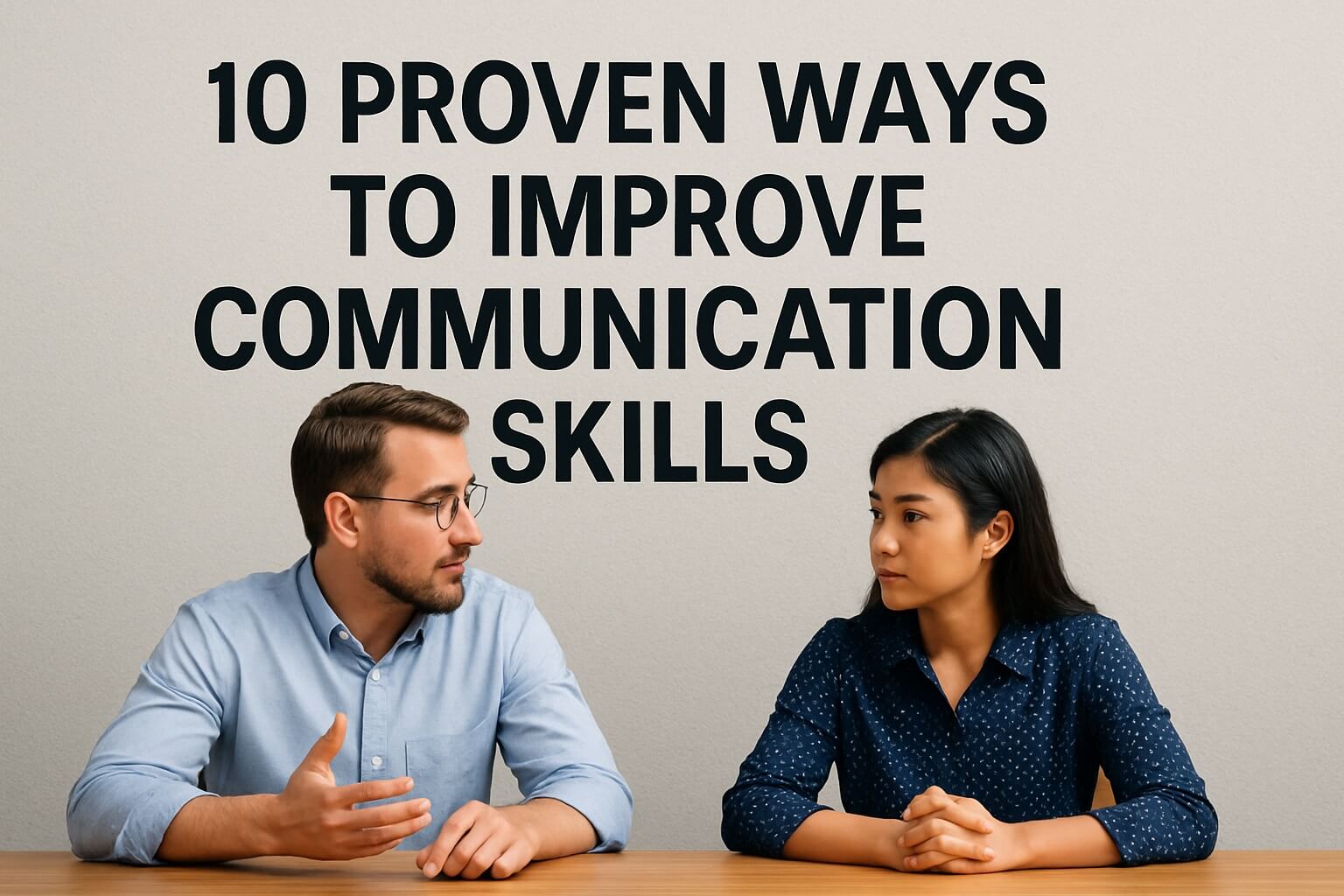
Effective communication is a powerful life skill, yet many were never formally taught it. Whether you're trying to speak more clearly at work, build deeper connections in your relationships, or avoid misunderstandings, improving your communication can create a positive ripple in every part of life.
Studies show that communication is the number one most in-demand skill globally. It influences everything from job interviews, client calls, family discussions, and group projects. The good news? Communication can be improved. Here are ten practical, evidence-based ways to sharpen your communication skills starting today.
Table of Content
- 1. Practice Active Listening
- 2. Watch Your Body Language and Tone
- 3. Speak and Write Clearly
- 4. Adapt to Your Audience
- 5. Invite feedback
- 6. Show Empathy
- 7. Build Confidence and Assertiveness
- 8. Choose the Right Time and Medium
- 9. Use Stories and Examples
- 10. Keep Practicing and Learning
- Conclusion
- Frequently Asked Questions

1. Practice Active Listening
Good communicators know when to stop talking. Active listening means being mentally and physically present while someone else is speaking. According to researchers at Utah State University, active listening builds trust and understanding. Brain studies even show that people feel more connected and valued when heard.
How to practice it:
-
Put away distractions (yes, even your phone).
-
Maintain eye contact.
-
Nod and offer small verbal affirmations like "I see" or "Go on."
-
Paraphrase key points to confirm understanding.
2. Watch Your Body Language and Tone
You might say the right words, but if your tone sounds off or your body language is closed off, the message might not resonate. Dr. Albert Mehrabian found that up to 93% of communication impact in certain contexts comes from nonverbal cues.
Try this:
-
Keep an open posture.
-
Use facial expressions that match your words.
-
Avoid crossed arms or looking away.
-
Speak at a steady pace with a friendly tone.
3. Speak and Write Clearly
Clear communication isn't about using fancy words. The shorter and simpler your sentence, the easier it is to understand. Research from Wylie Communications found that sentences of 8 words or fewer are understood 100% of the time.
Tips:
-
Use simple, direct language.
-
Eliminate filler words ("um," "like," "you know").
-
Organize your thoughts before speaking or writing.
-
Read emails or messages aloud before sending them.
4. Adapt to Your Audience
Your message should change depending on who you're speaking with. Explaining a concept to a child differs from presenting it to a team of professionals. Coursera recommends tailoring your language, tone, and examples to the person or group you're addressing.
Ask yourself:
-
What do they already know?
-
How formal should I be?
-
What's the best way to communicate this message (call, email, text)?
5. Invite feedback
Even the best communicators have blind spots. Feedback is your mirror. It shows you how others experience your message. According to Indeed, asking for feedback can help you pinpoint improvement areas.
How to apply this:
-
After meetings, ask, "Was that clear?"
-
Record yourself and watch for patterns (too fast, too quiet?).
-
Be open, not defensive, about suggestions.
6. Show Empathy
Empathy is about recognizing and respecting others' feelings. You don't have to agree—understand. Studies reveal that people with higher emotional intelligence (which includes empathy) are more effective communicators.
Use empathy by:
-
Listening without judgment.
-
Acknowledging feelings: "That sounds frustrating."
-
Adjusting your tone during tense conversations.
7. Build Confidence and Assertiveness
Confidence helps your message land. Assertiveness means expressing yourself clearly and respectfully. According to Indeed, people respond better to ideas presented with confidence, even simple ones.
Boost confidence by:
-
Standing tall and using steady eye contact.
-
Practicing difficult conversations in advance.
-
Avoiding excessive hedging ("maybe," "just").
8. Choose the Right Time and Medium
Sometimes, how and when you say something matter as much as what you say. Coursera recommends matching the message with the medium—for example, using email for updates but talking face-to-face for sensitive matters.
Consider:
-
Is now a good time?
-
Will this message land better in person or via email?
-
Is the recipient ready to hear this?
9. Use Stories and Examples
Stories stick. Research from Stanford University found that people remember stories up to 22 times more than facts alone. Whether you're giving a presentation or explaining your point of view, sharing a short story can make your message more relatable.
Make it work by:
-
Using real-life examples.
-
Sharing short anecdotes to clarify a point.
-
Describe a situation that your listener can visualize.
10. Keep Practicing and Learning
Communication isn't a one-and-done skill. Like any other ability, it improves with use. Harvard and Coursera encourage students to take workshops, join clubs like Toastmasters, or read expert books to keep growing.
Try this:
-
Practice in low-pressure settings.
-
Join a communication-focused group.
-
Reflect on what worked or didn't after key conversations.
Conclusion
Strong communication isn't about being perfect—it's about being aware, intentional, and always improving. These ten tips offer a foundation anyone can build on, regardless of their starting point. Start small and stay consistent; you'll soon notice stronger connections, smoother interactions, and greater confidence in every conversation.
Frequently Asked Questions
Q1. Can anyone improve their communication skills?
Yes. Communication is a skill that can be enhanced with effort, feedback, and practice.
Q2. Why is communication so important at work?
Good communication builds trust, boosts teamwork, and helps ideas be heard. Global employers rank it as the top soft skill.
Q3. How does active listening help relationships?
It makes people feel heard, respected, and valued, strengthening connections and reducing conflict.
Q4. Can introverts be great communicators?
Absolutely. Many introverts are excellent listeners and thinkers; they become thoughtful, effective speakers with practice.
Q5. How long does it take to improve?
Some changes can be felt in days or weeks. Mastery takes longer, but with regular effort, noticeable progress is guaranteed.
Communication Skills

